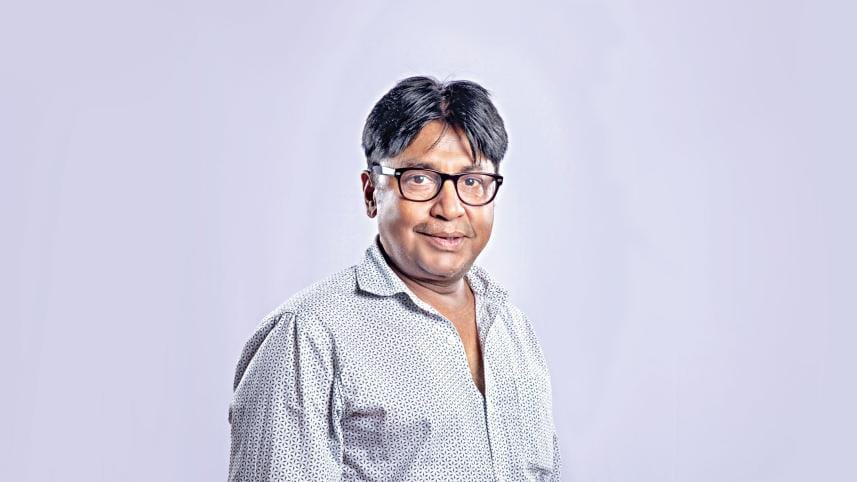Staying optimistic

Rafi Hossain: Selim Bhai, how has the pandemic affected your work?
Shahiduzzaman Selim: It has affected everyone involved significantly. Eid is one of those times we stay very active since it is also thematically relevant to our plays. The scheduled lockdown starting on August 1 is when a lot of production goes into action and films are released. Regardless, we are trying to continue shooting on a smaller scale while maintaining government rules and regulations.
Rafi Hossain: Rosy Siddiqui, how have your days been during the pandemic?
Rosy Siddiqui: It has been difficult. I feel frustrated sitting at home all day even though I have to for the situation to become stable again. This would normally be the time when I would be busy with work, but the pandemic has not only hampered it, but it has also been causing a lot of mental stress. It has caused a lot of problems socially and economically as well. My daughter lives abroad, and neither of us can visit each other due to travel restrictions. The amount of trouble it has caused me is truly indescribable, and I am not sure when things will go back to normal. I pray to God that we are relieved of this situation soon. I think an online counselling system should be set up in each household because I am sure people like me are also under constant stress. I also feel better when I talk to other people over the phone. It is not necessarily that I feel sad about not being able to go outside, but the feeling of being trapped inside my own home, constantly hearing bad news, is unbearable.
Rafi Hossain: How do you think it has affected our arts and culture?
Shahiduzzaman Selim: We were going at a certain pace in our journey of artistic endeavours. Now that there is a roadblock in that journey it is hard to start all over. I think it depends on your psychological strength. To explore one's artistic mind and creativity, one needs a calm, peaceful environment. Art cannot be practised when there is constant anxiety and even a fear of death. With the experience we have been gaining for the last few years, we could have seen a lot of great artists being discovered. But again, this roadblock has likely stopped a lot of progress, and I think it is a huge burden on our culture. There are also economic problems caused by the pandemic. If there are no returns, a producer has no incentive to invest in a project. Moreover, cinema halls are almost always empty nowadays. The producers that already started projects have to worry about when they can get back to them. But because this pace has been ruined, even if things go back to normal, I think it will not be the same.
Rafi Hossain: Do you think there is any way artists can utilize this time?
Shahiduzzaman Selim: I believe all aspects of art, whether it's acting or music or anything else, is about enriching yourself. Studying is incredibly important, and the pandemic has given us more than an adequate amount of time to do that. In the case of studying films, an artist could watch local and foreign films. However, it is not as easy as just saying that because with the pandemic comes mental, financial and social struggles, and one has to overcome those first.

Rosy Siddiqui: I agree with Selim. That is why I emphasized how important counselling can be, as counsellors can guide you through these negative times and bring out the positives in you as a person. It is good that I now have time to read, study, and give myself some time. However, our life and our economic situation have changed drastically. Artists require freedom, and I think the pandemic restricts this. Everyone also deals with it differently. Selim, for example, has bought several books throughout the pandemic, and I am glad he found a way to divert himself by reading. I, however, tried reading as well, but I could not get into the hobby because I constantly worry about the current situation and feel anxious. Everyone deals with it differently, and it is essential to help each other.
Rafi Hossain: What is the secret behind your lovely relationship?
Rosy Siddiqui: I believe in life there is not anything we can count on getting for certain. We have to look towards what is attainable, and if something is not, we have to learn to move on. Obsessing over certain things often causes sadness, frustration and depression. If you think something is attainable, you should try your level best at trying to earn it. If you fail, that is fine too, and you have to accept. I have followed this philosophy in the context of love, and it has worked out for me.
Shahiduzzaman Selim: I think there is a lot to learn from the childhood tale of The Hare and The Tortoise. That is, like Rosy Siddiqui said, that we should never obsess over getting something immediately. If you love someone, you should not give all your love at once. Some of the love should be saved for the next day. We have been together for 28 years, and we hope to be together for the rest of our life. The "race" is long and involves pain, sadness and hardships. I think, by taking love slow and steady, one can win the race.
Rafi Hossain: Why do you think some partners struggle in their relationships?
Shahiduzzaman Selim: I cannot speak for them because everyone has different experiences with love. From my perspective, I think it is important to first love yourself the most before engaging in romantic relationships. Otherwise, it is not possible to love someone else. This advice has been passed down upon us by our elders, and there is a reason for that. Nowadays, a lot of couples may rush into marriage. It is important to make a lot of considerations before making such a huge commitment. People should also not disregard others when there has been a relatively long gap in conversations. For example, when I talk to my close associates after a long time, we converse like we normally do. I think it is important to hold onto these meaningful relationships.
Rafi Hossain: It often seems like the friendships we build with people nowadays are never as strong as they used to be before. Why do you think that is so?
Shahiduzzaman Selim: When we were younger, we could put in the time and effort to form a better understanding between people. Later, it became increasingly difficult to put in the same amount of time and effort as before, which made it harder to form such real and unbreakable bonds.
Rafi Hossain: When we were younger, the theatre was thriving, and people would often go to watch plays. Why do you think that practice changed?
Shahiduzzaman Selim: Back then, there was a fight to make it in theatre as an actor. Over time, other factors added to it, such as the popularisation of television. We realised during our career that it was difficult to make a living in theatre, and many of us switched to television. That was because we had a love for acting, and while we would have loved to do so by performing in theatre, it became unfeasible for us. After that, newcomers became interested in television. They looked for a greater chance to become successful, make a living, and become a star. Unlike us, they did not seek a background in theatre and work in it for years. As a result, the theatre only gets mediocre performers, and their productions are unable to thrive. Without the presence of dedicated actors, it is impossible to get back to the previous standard. It can only make a comeback if the government provides adequate subsidies for arts and culture like other countries do. During the pandemic, I did a play in Dhaka Theatre that the government provided some financial support for, and the Shilpakala Academy let us perform it without any cost.
Rafi Hossain: So, it seems that the government is interested in such projects, wouldn't you agree?
Shahiduzzaman Selim: Definitely! But it is difficult to provide greater preference to this industry as our country still struggles with providing other necessities. Especially in the past two years, the government had to struggle significantly due to the pandemic. After such issues are resolved and become manageable, the focus can be on improving the arts and culture.
Rafi Hossain: OTT platforms are becoming increasingly popular. What changes are you expecting to happen following this?
Shahiduzzaman Selim: I don't believe it is important, as to me acting is simply acting, no matter what platform it is being expressed on. For the television industry to do well, certain measures must be taken. For example, international channels should not be allowed to compete with our local ones. Additionally, the license provided to those involved with television projects often goes to people who are not involved with the industry whatsoever. Nowadays, it has become more about business and commercialisation than the art and its quality itself. If this is not improved, we will lose out audience, which is already happening. Here, BTV is succeeding in terms of viewership compared to other non-governmental channels as they cater to a wider variety of people by providing different kinds of shows. As the other television channels only focus on the news and television series, they lose views. It has only pushed the audience to go towards international platforms. There needs to be a set of rules and regulations from the government. That is the only way to resolve this issue.
Rosy Siddiqui: I agree with Selim on this idea that the government needs to set up specific rules to monitor and promote higher quality local content. However, I also wonder if the government is receiving the complaints and solutions we have. I believe that there is a communication gap that we need to bridge. Moreover, journalists and the media also have a role to play here. Often, they praise artists after one small success without judging their skills over some time. I think it's important to promote those who have worked hard to be the best they can be. Only then can the quality we are hoping to see can be achieved.
Rafi Hossain: Do you have any message for our readers?
Shahiduzzaman Selim: I hope the discussion today will be fruitful and will reach people.
Rosy Siddiqui: While it is a hard time for us now, we need to find positivity. I hope we will learn from this and be able to utilise it in the future. I wish everyone all the best, and please keep us in your prayers.
 For all latest news, follow The Daily Star's Google News channel.
For all latest news, follow The Daily Star's Google News channel.
Comments